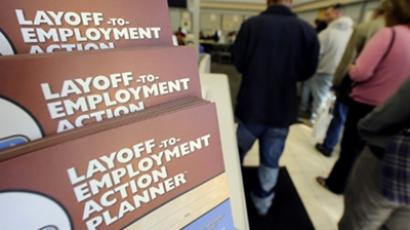America’s homeless middle class

Simple luxuries like taking a family vacation or just taking the kids out to eat is nothing but a distant memory to many American families who once considered themselves middle class and are now fighting to stay off the streets.
After one of the worst economic downturns in our history, families who were breathing easy, just a couple of years ago, are now buried in a mountain of debt and being forced from their homes.Sunny southern California has long been a favored destination for those pursuing stardom and wealth.Throughout the years, families have lived the American dream of comfort and increasing prosperity, but these days many of those families are caught up in a nightmare of escalating poverty. The economic crisis has touched the previously untouched middle class.“What we have seen in the last two years with the recession is an increase in the number of families who are asking for assistance, some for the first time,” said Christine Mirasy-Glasco, Executive Director at Beyond Shelter. Beyond Shelter is a non-profit service, which exclusively helps homeless families a place to live.Among the people receiving help from Beyond Shelter is Taisha Mayberry.She is trying to raise her two daughters while she struggles to keep a place to live. The Mayberrys are typical of the growing trends of families that slide from the middle class to poverty.“I had the best of everything, because at that time, my son’s father was participating and he was working and I was working and we didn’t have to depend on the county and Medi-Cal and off-brand subscriptions,” said Mayberry about her life in America’s middle class. “We had the best because we were working.”That was then and this is now. Mayberry receives food stamps and relies on Beyond Shelter so that she and her children have a bed to sleep in. She has had to overcome many challenges in her life, but before Mayberry lost her job, she never imagined she would be fighting to stay off the streets.“Every day I had to figure out, where I was going to sleep at or how we were going to sleep,” said Mayberry.Job security is gone. The unemployment rate is stuck in the double digits around the Los Angeles area. With few opportunities for well paying jobs, more Americans are seeing their wealth disappear.It is estimated that banks will take back more than a million homes this year due to foreclosure. Another sign that housing affordability across the US continues to decrease.Los Angeles is the top region for homelessness, where more than 40 thousand people have no place to sleep on a nightly basis.Nationwide, family homelessness has risen 9 percent last year according to a recent report by the U.S. Conference of Mayors. The real numbers may actually be higher.DeWayne Nichols has been unemployed for two years.“I’m out of work so I’m bouncing from this friend’s house to that friend’s house. Different cities, just try to find work,” said Nichols.He lived comfortably for years working as a floor installer. Now he is unemployed and cannot pay rent.Nichols relies on the kindness of loved ones, and government food stamps. Social programs that help stressed families hang on are about to be lost to political games as lawmakers in Washington, DC, wrestle with future budget cut , while battling to save tax cuts for the richestThis, Nichols fears, could push many already desperate families over the edge.“If they cut food stamps off, honestly I think that jails would probably fill up because, people don’t want to steal, but if push came to shove, what else am I going to do,” he said.What am I going to do? It is a question Mayberry asks herself daily since she joined the army of the newly poor struggling to survive.“I’m looking for a job every day and just praying,” she said. “That’s all I can do.”Mayberry will raise her children hoping for a Hollywood ending to her ongoing story.














